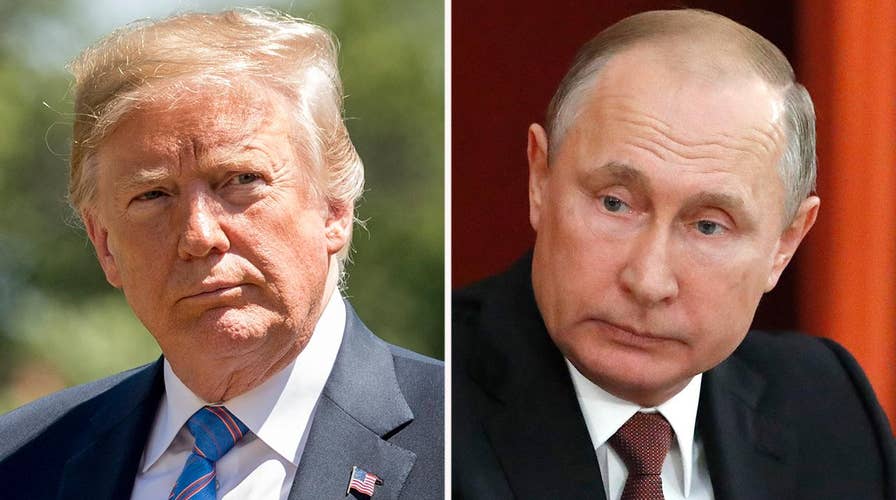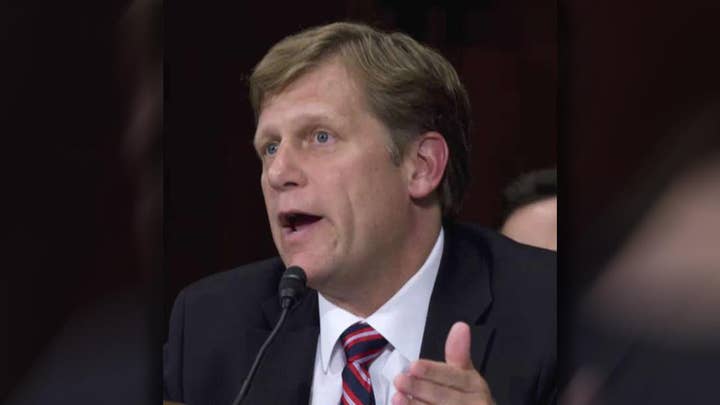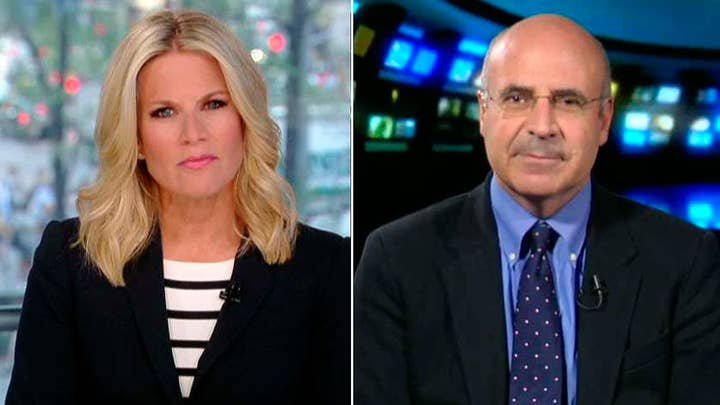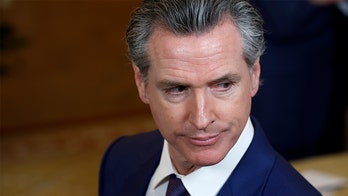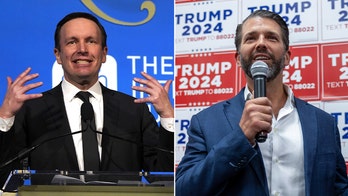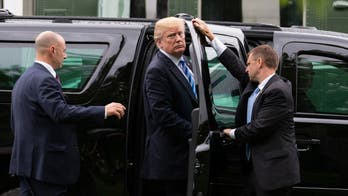Trump says he holds Putin responsible for Russian meddling
Report: Trump briefed on Putin's role in Russian interference 2 weeks before taking office. Kevin Corke reports from the White House.
The White House sought Thursday to tamp down another firestorm that broke out in the wake of President Trump's summit with Vladimir Putin, making clear the president does not support the Russian leader's proposal to allow his government to interview American officials.
"It is a proposal that was made in sincerity by President Putin, but President Trump disagrees with it," Press Secretary Sarah Sanders said in a brief statement on Thursday afternoon.
The statement came as the administration faced mounting backlash for even entertaining Putin's proposal, which pertained to the Robert Mueller probe.
The Russian leader on Monday had proposed an unusual quid pro quo, offering to let the special counsel team question newly indicted Russian officers as part of the election meddling case, if Russians could question certain U.S. individuals.
Trump, on the spot at their Helsinki press conference, called the offer “incredible.” On Wednesday, Sanders neither endorsed nor rejected the offer.
"He wants to work with his team and determine if there’s any validity that would be helpful to the process," Sanders said, noting Trump has made no "commitment."
"The president is going to meet with his team," she said.
But the plan swiftly set off alarm bells in Washington, especially among Putin's apparent targets.
The first individual Putin voiced interest in questioning was Bill Browder, a prominent critic despised by the Kremlin for his role in pushing sanctions legislation around the world.
Browder, the CEO and co-founder of Hermitage Capital, has worked for years to advocate on behalf of his associate Sergei Magnitsky, whom he had hired to uncover massive financial fraud in Russia. Magnitsky died in Russian police custody nearly a decade ago, allegedly beaten to death. Browder later successfully pushed Russia sanctions legislation named after Magnitsky in the U.S. and beyond.
Browder, an American-born British citizen, noted to Fox News that Trump would not have “jurisdiction” over him.
But Putin's list grew longer as soon as the summit was over.
On Tuesday, news agencies linked to the Russian government reported that prosecutors were seeking to interview former U.S. Ambassador to Russia Michael McFaul and 10 other "U.S. officials and intelligence agents" in connection with their case against Browder. Russian prosecutors accused the financier of laundering $1.5 billion through offshore accounts and donating $400,000 of that to Hillary Clinton's 2016 presidential campaign.
Russia also wants to question former Assistant Secretary of State for Democracy, Human Rights, and Labor David Kramer; Department of Homeland Security official Todd Hyman; CIA agent Jim Rote and John Kerry aide Jonathan Winer, among others, according to Russia’s “Interfax” news agency.
McFaul, who was ambassador to Russia from 2012 to 2014, blasted the initial White House response in an email to Fox News on Wednesday.
“Work with his team to do what?” he wrote. “The Trump administration needs to denounce categorically the moral equivalency between a legitimate indictment of Russian intelligence officers and a crazy, invented Russian conspiracy about American government officials assisting in an alleged money laundering scheme to help the [Hillary] Clinton campaign.”
And Browder told Fox News that, given his British citizenship, Trump would “have to discuss that with [British Prime Minister] Theresa May and I don’t think she’d be too happy about turning me over to Putin."
A spokesman for May’s office declined to comment.
As the controversy gained steamed in Washington, the Senate on Thursday afternoon also unanimously approved a nonbinding resolution opposing making current and former U.S. officials available for questioning by Russia.
Earlier Thursday, Senate Minority Leader Chuck Schumer, D-N.Y., blasted the president as he pushed the resolution.
“That President Trump would even consider handing over a former U.S. ambassador to Putin and his cronies for interrogation is bewildering,” Schumer said on the Senate floor Thursday. “... If the president ever agreed to such a request, Congress must do everything in its power to block it.”
But FBI Director Christopher Wray, at a security forum Wednesday, downplayed the likelihood that such a bizarre exchange of supposed suspects would ever take place.
The State Department also made clear that it rejects Russia's underlying allegations. Spokeswoman Heather Nauert called the “assertions” made by the Russian government “absurd,” and stressed that the U.S. “does not stand by those assertions,” noting that the “prosecutor general in Russia is well aware that the United States has rejected Russian allegations.”
And on Thursday, as Sanders seemed to all but nix the Putin proposal, she made clear the U.S. would still like to interview the indicted Russians.
"Hopefully President Putin will have the 12 identified Russians come to the United States to prove their innocence or guilt," she said.
The latest statement comes after the White House has moved to clean up two other controversial comments. First, Trump said he misspoke when he seemed to accept Putin’s denial of meddling in the 2016 election. And on Wednesday, after Trump seemed to say the Russians were no longer targeting U.S. elections, Sanders said Trump was actually responding to something else.
Trump, meanwhile, continued to brush off criticism of the Putin summit, floating the possibility earlier Thursday of a “second meeting” with the Russian president.
“The Summit with Russia was a great success, except with the real enemy of the people, the Fake News Media. I look forward to our second meeting so that we can start implementing some of the many things discussed," Trump tweeted.
He described their agenda as "stopping terrorism, security for Israel, nuclear proliferation, cyber attacks, trade, Ukraine, Middle East peace, North Korea and more."
House Democrats also are pushing to find out what more, if anything, was agreed to in the one-on-one Trump-Putin summit.
House Intelligence Ranking Member Adam Schiff, D-Calif., and committee member Rep. Eric Swalwell, D-Calif., moved to subpoena Trump’s interpreter on Thursday, but Republicans rejected the motion.
"For the sake of America's national security, Congress should hear from the Trump-Putin translator. We need to know if the president divulged national security secrets or struck any secret deals. He has a prior history of disclosing national security secrets in private to the Russians. There's good reason to suspect he may have done so again,” Swalwell told Fox News.
Fox News' Kelly Chernenkoff, Samuel Chamberlain and Chad Pergram contributed to this report.
